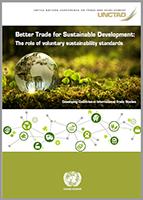
The 2030 Agenda for Sustainable Development of the United Nations constitutes the most important and comprehensive global sustainable development agenda for the next decade. It is known for its far-reaching and ambitious vision with its 17 sustainable development goals (SDGs) and 169 targets that are listed as part of the so-called “universal policy agenda” (United Nations, 2015). In the 2015 Agenda, and especially in SDG 17, international trade is singled out as a key policy instrument to contribute to all other SDGs.
The 2030 Agenda for Sustainable Development defines international trade as “an engine for inclusive economic growth and poverty reduction, [that] contributes to the promotion of sustainable development”. In order to become a ‘sustainable engine’ one approach that seems to be increasingly used is to internalize social, economic and environmental concerns in international trade. This can be done by many different means and policy instruments and tools.
In this report we focus on a specific tool, namely Voluntary Sustainability Standards (VSS) which comprise of certification schemes, labeling programs and private standards. VSS aim to make global value chains, from producer to consumer, more sustainable by taking into account social and environmental requirements in the production process. VSS also often link developing countries (where many producers are based) to developed countries.
This report discusses in-depth the possibilities and limitations of VSS to make international trade more sustainable, in particular with regards to developing countries development opportunities. We first introduce the key concepts of trade, global value chains, sustainable development, their interrelatedness and their importance for developing countries.
We focus on the rise of international trade and the changing nature of trade which is characterized by the dominance of global value chains. The emergence of global value chains allows producers in developing countries to be integrated in global economic dynamics which can contribute to their economic development. In addition, global value chains allow for the diffusion of social and environmental standards throughout production processes. VSS play an important role in this diffusion of social and environmental standards.
We argue that global value chains can be governed in a way which enhances economic, social and environmental ‘upgrading’, i.e. a process by which negative social and environmental consequences are addressed in global value chains and which contributes to better protection of social and environmental standards. We show that upgrading through the governance of global value chains directly allows producers in developing countries to access global markets and reap their potential benefits contributing in this way to economic development in developing countries.


